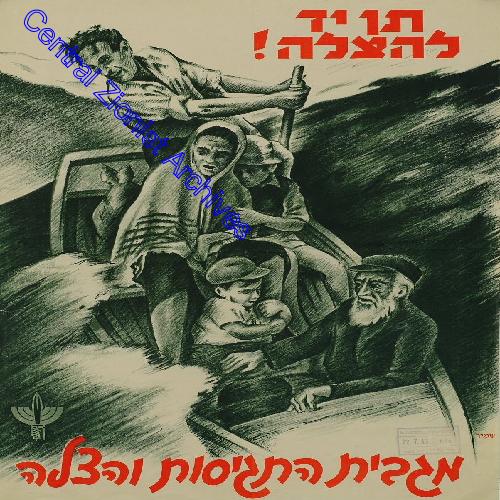
At the end of the 1930s the situation for European Jewry worsened and, as the atmosphere of war intensified, more Jews sought to escape. It was precisely at this hour that the gates of all countries were closed to them. The Evian Conference, convened in 1938 to solve the Jewish refugee problem, offered no solution to their plight. Moreover, the gates of the Land of Israel, the national home promised in the British Mandate of 1922, were closed to the refugees. Britain, as part of its efforts to secure Arab support for the imminent war, announced its withdrawal from the U.N. Partition Plan, and continued to restrict immigration quotas in “The White Paper" of 1939, which limited immigration to 75,000 Jewish people for five years.
For the first time in the history of the wandering of the Jewish people, the world was divided into the countries from which the Jews were expelled, and to countries where they were not allowed to enter. At this stage, the Jewish Agency Executives began to support what was to become known by international authorities as the "illegal immigration". During the war, the ports of Constanta, Brăila, and Sulina were almost the only gateways of escape from Europe that remained open to the Jews. Until April 1942, an Eretz Israel office remained open in Bucharest, and emigration from Romania continued with the encouragement of the authorities.
In the period between March 1941 and autumn 1942, emigration was prohibited because Romania's ruler Ion Antonescu, in accordance with an agreement with Nazi Germany, planned to send all the Jews of the "Regat" (the Old Kingdom of Romania and Southern Transylvania) to be exterminated in the Bergen- Belsen camp, in Poland. Emigration was allowed again allowed after Antonescu changed his mind concerning the deportations, under the influence of the course of war, of relations with the Nazi leaders, and of the interventions of the Jewish leaders, mother Queen Elena and the young King Michael, and of some Romanian intellectuals and clergy.
In the winter of 1942, the Romanian government adopted emigration as a solution to the Jewish problem, and agreed to free some seventy thousand Jews, demanding large sums of money in exchange for release (tens of billions of lei). The plan had no chance of succeeding, since the Jews' transfer depended on the good will of the Germans, while Adolf Eichmann did everything to foil the plan. The tragedy of the Jewish emigrants is highlighted by the two illegal immigrant ships that were sunk on their way to Eretz Israel: in December 1942 the "Struma" carrying 769 immigrants, and in August 1944 the "Mefkura" with 320 immigrants aboard. During wartime itself, less than five thousand Jews emigrated directly from Romania to Palestine.
All this time, the Zionist movement in Romania, under the leadership of Abraham LeibZissu, continued to operate. Following a secret decision by the British government that entry to Palestine would be granted to any Jew arriving from Turkey, LeibZissu worked to convince the members of Antonescu's Fascist government to allow the Jews to leave.
Towards the end of the war, the Romanian government authorized the Jewish Agency to reopen the Palestine office. Under the pressure of the war course (the United Nations broadcasting stations continually repeated the warnings against those who were guilty of crimes against humanity), Antonescu himself authorized the opening of the office on June 9, 1944.
In the accompanying authorization letter, he mentioned four ships which would be allowed to sail under a foreign flag from Romania, carrying orphans from Transnistria and Jewish refugees from other countries. The office was granted permission to issue identity cards to refugees from Poland, Hungary and Slovakia, and in this way many Jews were saved from extradition to the Nazis.
During the war years, more than 13,000 refugees managed to leave Europe on thirty one ships, through the ports of Romania.